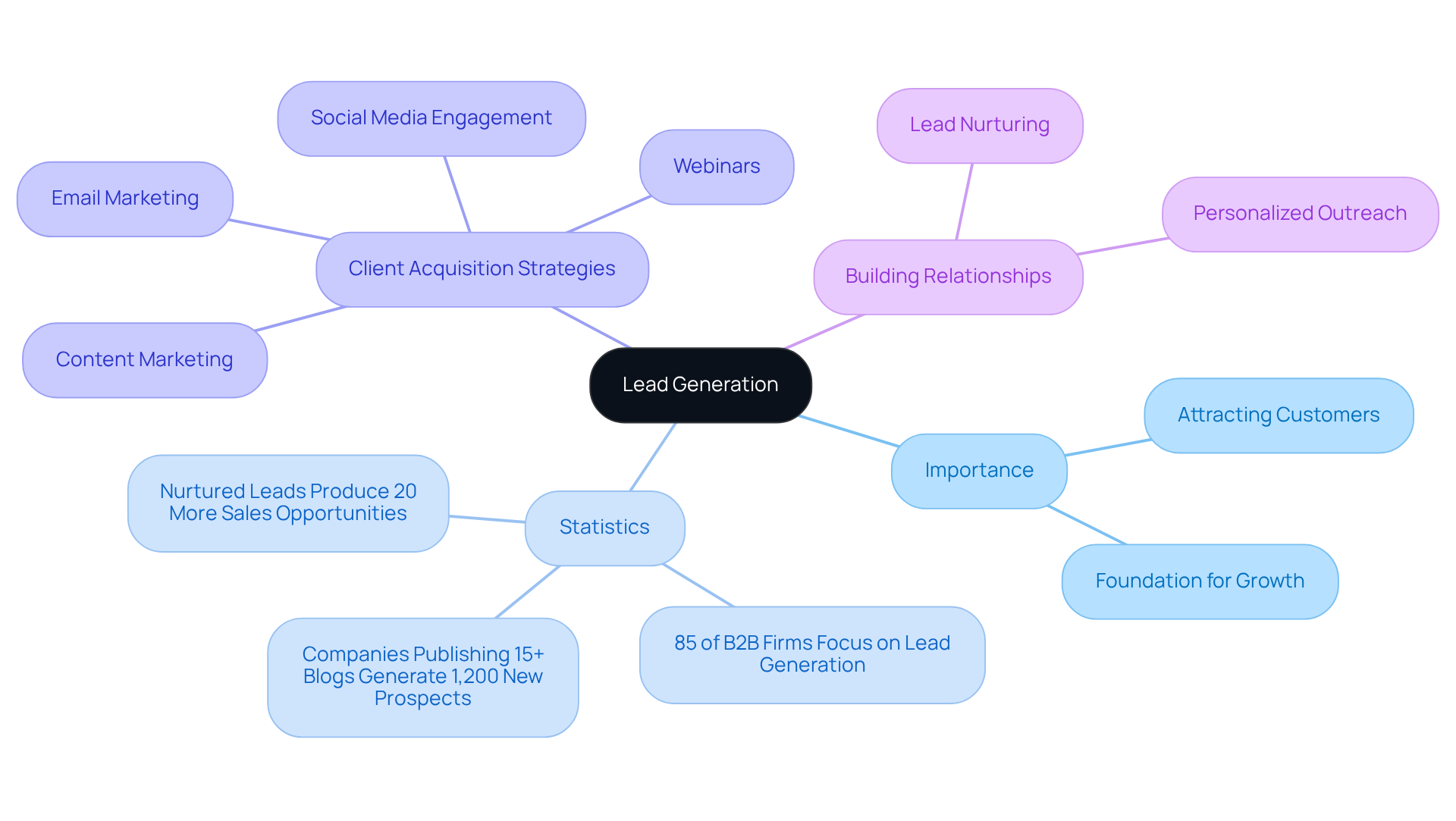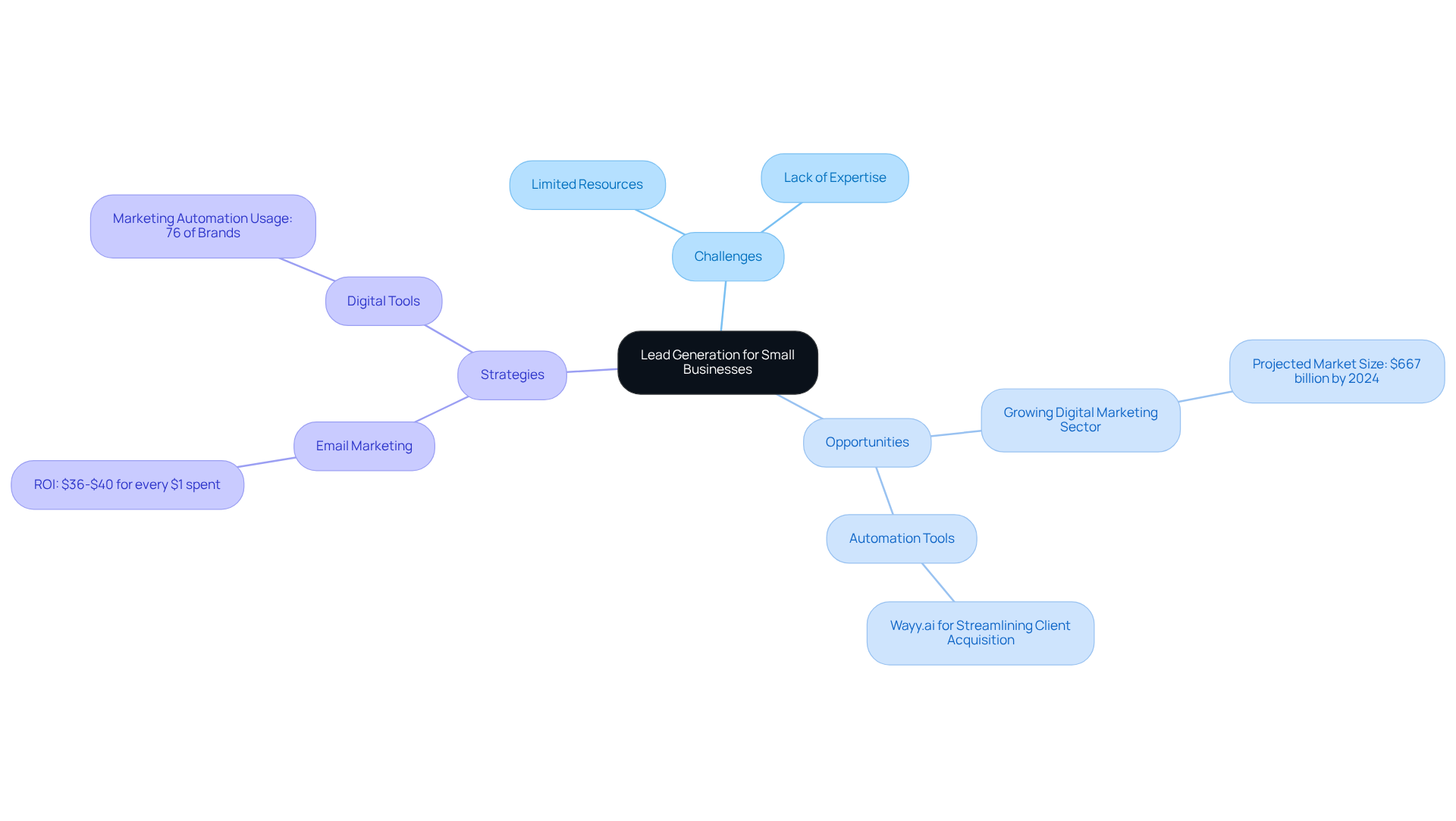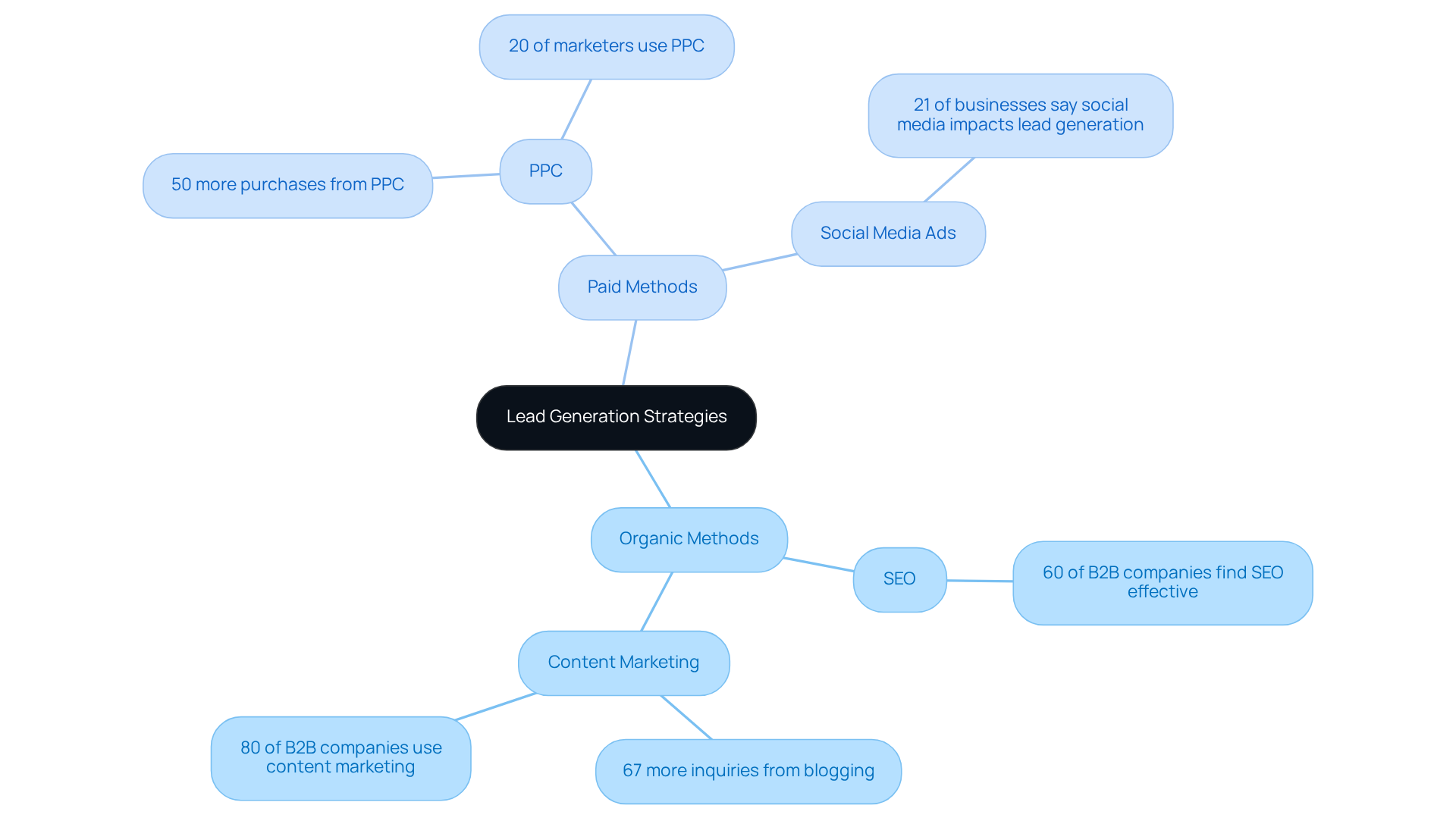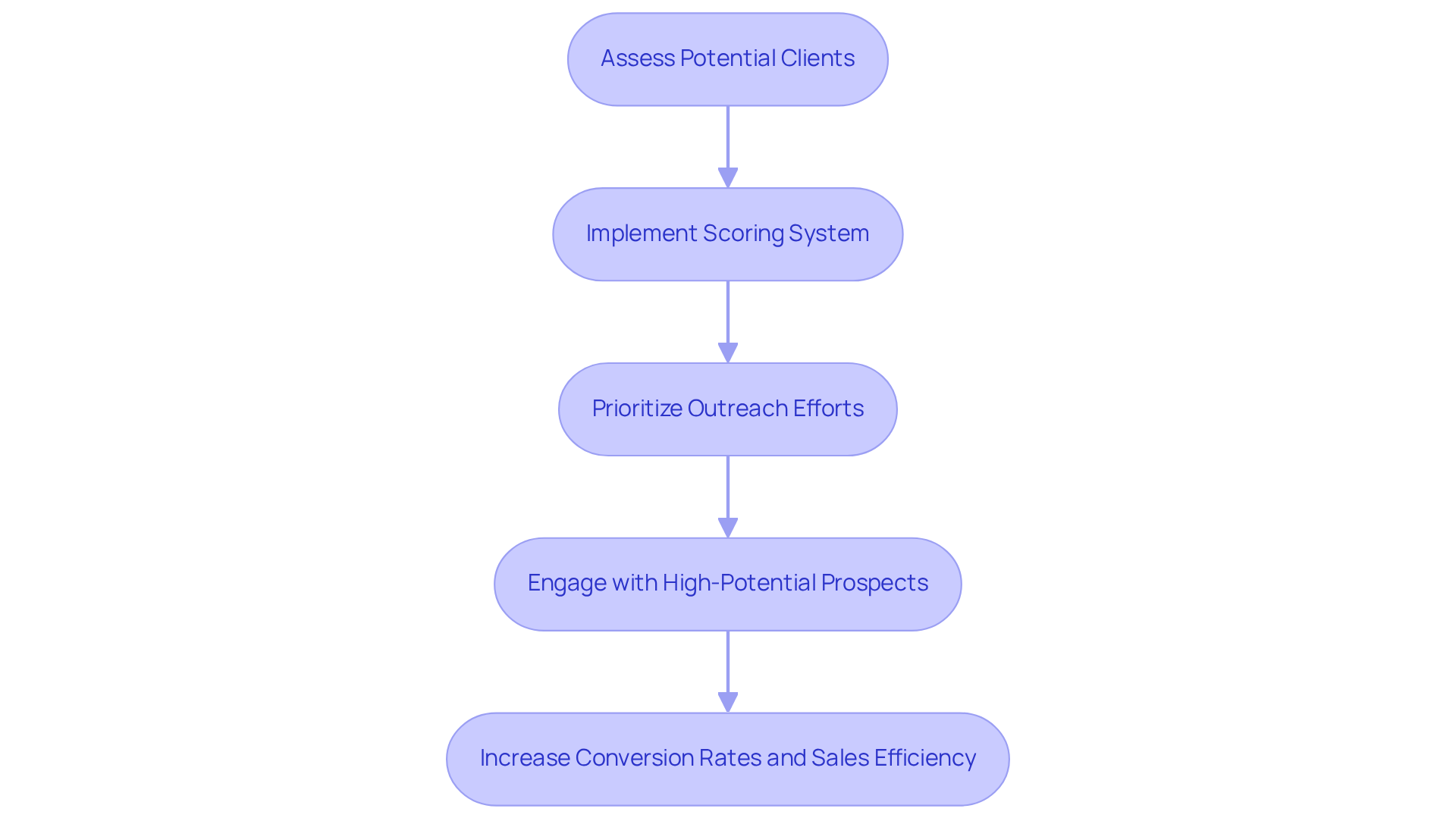Overview
Lead generation is essential for small businesses, as it involves attracting and converting potential customers. This process lays the groundwork for increased sales and customer loyalty. We understand that effective lead generation strategies, such as content marketing and automation tools, can empower small enterprises. These strategies help you overcome resource limitations and enhance your client acquisition efforts, fostering sustainable growth.
Consider how content marketing can connect you with your audience on a deeper level. By sharing valuable insights and stories, you not only attract potential customers but also build trust. Automation tools can streamline your efforts, allowing you to focus on what truly matters—nurturing relationships with your clients. Together, these approaches can transform your business journey into one of growth and connection.
As you explore these strategies, remember that you are not alone. Many small business owners face similar challenges, and by embracing these solutions, you can pave the way for a brighter future. Let's take these steps together, fostering not just growth, but a community of support and success.
Introduction
Lead generation is a vital cornerstone for small businesses aiming to flourish in today's competitive marketplace. By effectively attracting and converting potential customers, these enterprises can enhance their visibility and foster lasting relationships that drive sales growth.
Yet, many small business owners, with limited resources and expertise, find themselves asking: how can they navigate the complexities of lead generation?
In this article, we will explore the essential concepts of lead generation, the strategies that empower small businesses, and the transformative impact of understanding and implementing effective client acquisition techniques.
Together, we can tackle these challenges and pave the way for your success.
Define Lead Generation: Core Concepts and Importance
Lead acquisition is a vital process for small enterprises, as it involves attracting and converting potential customers into leads, highlighting what does lead generation mean for individuals or organizations interested in your products or services. This process lays the foundation for developing a loyal customer base and increasing sales, which we know relates to what does lead generation mean for your growth.
Imagine the impact of efficient client acquisition on your visibility and credibility. It not only enhances trust among potential customers but also opens doors to substantial growth. For instance, companies that publish 15 or more blog posts each month can generate about 1,200 new prospects. This demonstrates how consistent content creation can significantly influence your business.
Moreover, consider that 85% of B2B firms identify prospect creation as their primary marketing objective, highlighting what does lead generation mean for their strategies. This statistic highlights the crucial role it plays in . By implementing focused client acquisition techniques, you can navigate the competitive landscape with confidence, promoting sustainable development for your business.
Together, we can address these challenges and work towards achieving success. Remember, every step you take in lead acquisition is a step towards building lasting relationships with your customers.

Contextualize Lead Generation for Small Businesses: Challenges and Opportunities
Small enterprises often encounter significant hurdles in attracting clients, primarily due to limited resources and expertise. Many entrepreneurs find themselves lacking the marketing knowledge or budget required to effectively implement traditional strategies, raising the question of what does lead generation mean. However, the rise of digital marketing and automation tools has opened new doors for these businesses. For instance, platforms like Wayy.ai empower independent entrepreneurs to streamline their client acquisition processes. This allows them to focus on essential activities while . Such technological advantages enable smaller enterprises to navigate resource constraints and connect with a broader audience, ultimately enhancing their sales pipeline.
Looking ahead to 2025, the global digital advertising and marketing sector is expected to reach approximately $667 billion, presenting a growing opportunity for local enterprises. With 76% of brands now utilizing marketing automation, the landscape is shifting towards smarter, data-driven strategies. Moreover, 91% of marketers recognize that understanding what does lead generation mean is their primary objective, which underscores its vital importance. As Wayne Davis notes, "The customer acquisition process begins by discovering where your target market 'resides' online," emphasizing the need for smaller enterprises to understand their audience. By embracing automated solutions, these businesses can not only boost efficiency but also foster meaningful relationships with potential clients, thereby overcoming the challenges typically associated with client acquisition. Additionally, email marketing has proven to be a powerful tool, generating $36 to $40 for every $1 invested, making it an effective strategy for modest enterprises looking to enhance their customer acquisition efforts.

Explore Lead Generation Strategies: Techniques for Effective Client Acquisition
Acquiring clients can be a challenging journey for small businesses, but knowing what lead generation means can help you navigate this path with confidence. A blend of natural and sponsored approaches can make a significant difference. For instance, search engine optimization (SEO) is vital; nearly 60% of B2B companies recognize its substantial impact on generating prospects. By enhancing your website, you can naturally increase visibility and attract potential clients. Additionally, content marketing can elevate this effect. Companies that maintain a blog receive 67% more inquiries than those that don’t, and they generate three times more responses than traditional marketing methods. This demonstrates the power of in connecting with your audience.
Alongside organic strategies, consider the benefits of paid advertising, such as Google Ads and social media ads. These tools allow you to reach specific demographics, increasing your chances of conversion. For example, pay-per-click (PPC) campaigns can boost the likelihood of purchases by 50% compared to organic visitors. It’s worth noting that 20% of marketers rely on PPC for acquiring prospects, highlighting the effectiveness of these paid strategies.
Moreover, networking events and strategic partnerships can serve as valuable avenues for creating opportunities. They provide a platform for meaningful interactions with prospective clients. However, we understand that small enterprises often face challenges in this area, such as limited resources, financial constraints, and staffing issues. By integrating these diverse tactics and addressing these challenges, you can build a robust client acquisition framework, which raises the question of what lead generation means. This approach not only optimizes your outreach efforts but also drives conversions, ultimately enhancing your growth potential. Together, we can achieve success in this endeavor.

Understand Lead Qualification: Enhancing Conversion Rates and Sales Efficiency
Prospect qualification is a vital process for small businesses, as it involves assessing potential clients to gauge their likelihood of becoming paying customers. This assessment takes into account various factors, such as fit, interest, and readiness to purchase. By implementing a scoring system for prospects, small enterprises can effectively prioritize their outreach efforts, focusing on those contacts with the highest potential for conversion. Did you know that companies utilizing scoring for prospects have reported an impressive 77% increase in conversion rates and a 79% boost in revenue from marketing efforts, according to Gleanster Research?
Tools like Wayy.ai play a crucial role in this journey by monitoring purchase intent signals, enabling businesses to engage with prospects at just the right moments. This strategic approach not only enhances conversion rates but also significantly improves sales efficiency. Small teams can achieve remarkable results without feeling overwhelmed, as scoring helps optimize their efforts and concentrate on high-potential prospects. In fact, organizations that adopt scoring methods have seen improvements in their sales processes, with nurtured prospects generating 20% more sales opportunities at a lower cost.
Collaboration with the sales team is essential for effective opportunity scoring, as their insights can refine the scoring criteria and enhance accuracy. Regular assessments and updates of the scoring system are also important to adapt to changing market dynamics and ensure ongoing effectiveness. Ultimately, helps small businesses understand what does lead generation mean, enabling them to allocate their resources wisely and connect with leads that are most likely to become loyal customers. Together, we can navigate these challenges and achieve success.

Conclusion
Lead generation is a crucial element for small businesses, acting as the vital link between attracting potential customers and nurturing them into loyal patrons. By recognizing its significance, you not only enhance your visibility and credibility but also pave the way for sustainable growth. When you effectively implement lead acquisition strategies, you lay the foundation for long-term success in a competitive market.
In this article, we explored various facets of lead generation, including its definition, the challenges you may face, and the opportunities available through digital marketing and automation. Insights into effective strategies, such as search engine optimization, content marketing, and lead qualification techniques, demonstrate how these approaches can significantly improve your client acquisition efforts. The statistics highlighted here underscore the importance of consistent content creation and the potential of automated solutions to streamline your processes and enhance conversion rates.
In conclusion, embracing lead generation is essential for small businesses like yours aiming to thrive in today's marketplace. By leveraging the insights and strategies we've discussed, you can not only overcome resource constraints but also build meaningful relationships with your target audience. The journey of client acquisition may seem challenging, but with the right tools and techniques, you can transform prospects into loyal customers, driving growth and success for years to come. Together, we can achieve this success.
Frequently Asked Questions
What is lead generation?
Lead generation is the process of attracting and converting potential customers into leads, which is essential for building a loyal customer base and increasing sales.
Why is lead generation important for small enterprises?
Lead generation is vital for small enterprises as it lays the foundation for developing a loyal customer base, increasing sales, and enhancing visibility and credibility in the market.
How does consistent content creation affect lead generation?
Consistent content creation, such as publishing 15 or more blog posts each month, can significantly influence lead generation by potentially generating about 1,200 new prospects.
What percentage of B2B firms prioritize lead generation?
85% of B2B firms identify prospect creation as their primary marketing objective, highlighting the critical role lead generation plays in their marketing strategies.
How can focused client acquisition techniques benefit a business?
Implementing focused client acquisition techniques can help businesses navigate the competitive landscape confidently and promote sustainable development.
What is the ultimate goal of lead acquisition?
The ultimate goal of lead acquisition is to build lasting relationships with customers, which contributes to long-term business success.




